“I believe Scotland should be independent, but without Trident’s we’re defenceless – we just can’t take the risk. I hope you understand.”
“The only reason anyone even listens to us is because we have Trident. Trident’s the reason we have peace, and security, and freedom of speech. Without it, we’ll be walked all over.”
“Look around us. All those shipyards, IBM, the ropeworks: they’re all gone. What do we have left? If Trident goes, we’ll have nothing. Nothing. I don’t like it any more than you, but we have to protect what we’ve got.”
“The only thing stopping me voting for you is the jobs at Faslane. We can’t afford to lose Trident.”
“I’m so sorry, I would vote yes, but my son works on one of the Trident submarines, so… you know. I have to…”
Do you have any idea how many times variations on those phrases came up on the referendum campaign? I heard it from frightened pensioners on the doorsteps, from young people stopping by our stall, from angry workers in our shop waving newspapers in our faces, from tea drinkers at church halls. Even folk walking in and out of the polling both on the day who felt some need to explain themselves – completely unsolicited, as if they were asking penance. Worst of all, I heard this from people who wanted to vote Yes, ached to vote Yes, believed that they should vote Yes – but they wouldn’t. Because they felt Trident was too important to lose – either because of the jobs, the protection, or both.
I’m convinced Trident is a significant reason many in Inverclyde voted No. Many people I talked to believed that Inverclyde needed those jobs. Inverclyde’s disproportionately large elderly population undoubtedly recall the Greenock blitz, and thus have genuine fears of the Russians or the Iranians or the North Koreans or whoever the government is telling us to be terrified of instead of Iain Duncan Smith. They remember when ships thronged the Clyde, and despair at the emptiness of the river. They lived through the War and the aftermath, and have no desire to return to those days – anything that could protect them, they supported wholeheartedly.
The other party* were the champions of Trident in Inverclyde. Oh sure, they talked a good talk about disarmament, how they felt they should be cancelling Trident renewal, but they wouldn’t, because they felt Trident was too important to lose – either because of the jobs, the protection, or both. See how it works? Yet at the end of the day, this was all talk. Prior to the referendum, the party throughout the UK was pro-renewal. Their leader was pro-renewal. Their leader in Scotland didn’t even have the gumption to say whether or not she was pro-renewal.
After the referendum, left-wing anti-nuclear voters and members haemorrhaged from the party to the SNP, but their UK leader, their new Scottish leader, and party line mostly remained pro-renewal. Indeed, the number of pro-renewal Scottish MPs vastly outnumbered the anti-renewal MPs. The Scottish electorate responded by taking an anti-renewal stance on all but one of their parliamentary careers – and this looks to be replicated in the Scottish election next year. Even a new, left-wing, anti-renewal leader hasn’t budged polls, which are predicting an even worse election performance for next year. Something has to be done to turn the party’s fortunes around.
The party’s answer? Maybe the SNP were right on this.
So. After years of browbeating us about the necessity of Trident, about how we need those jobs, about how we need nuclear “deterrents,” about how we need to be big players on the world stage, the party’s delegates have decided, in a not-at-all close contest, “you know what? Let’s not renew Trident after all.”
This, after all the things they said.
What I said when I made the Bank of England independent remains even more true today, I said that our new monetary and fiscal regime was founded on stability first, foremost and always, stability yesterday, today and tomorrow.
And I mean not just stability by securing low inflation but stability in our industrial relations, stability through a stable and competitive tax regime, and stability through a predictable and light touch regulatory environment – a stability founded on our strength to make the right long term decisions, the same strength of national purpose we will demonstrate in protecting our security in this Parliament and the long-term – strong in defence in fighting terrorism, upholding NATO, supporting our armed forces at home and abroad, and retaining our independent nuclear deterrent.
In an insecure world we must and will always have the strength to take all necessary long term decisions for stability and security.
– Gordon Brown, former MP (Kirckcaldy & Cowdenbeath) and Prime Minister, 2006“I support the Government’s announcement to proceed to the initial stages of Trident’s renewal. Much as I would prefer a world without nuclear weapons, Britain’s independent nuclear deterrent has been at the centre of our peace and security for over half a century and as long as there are other countries with such capability, I believe the UK needs to retain this weapon to protect the Scottish and the British people.”
– Ken Macintosh, MSP (Eastwood), during the Scottish Leadership campaign, 2011“I believe that the UK should retain an independent nuclear deterrent, while other countries possess nuclear weapons.
I’m proud of (the party’s) record in Government which led to the UK being widely recognised as one of the most forward-leaning nuclear weapon states in generating momentum for disarmament.”
– Tom Harris, MP (Glasgow South) during the Scottish Leadership campaign, 2011“While I appreciate your questionnaire schedule is long past, I would offer my general view that Britain should use its nuclear weapons as a bargaining counter to achieve nuclear disarmament, while at the same time continuing to pursue a rigorous policy of preventing further nuclear weapons proliferation. ”
– Lewis MacDonald, MSP (North East Scotland) during the Scottish Leadership campaign, 2011“There are over 11,000 jobs dependent on the base. The SNP would remove Trident, devastating our local economy and turning Helensburgh into a ghost town… The SNP also fail to acknowledge that almost 3,000 new jobs will be created with the impending expansion of the base. These too would be jeopardised by the SNP plans to scrap Trident.”
– Jackie Baillie, MSP (Dumbarton), 2012“We have been told Faslane’s facilities could be replicated at an existing English naval base but the Royal Naval Armaments Depot at Coulport is unique in the UK. It could mean that effectively the UK’s nuclear weapons will be based in a foreign country for many years. There are also of course huge cost implications of making such a transition.
Unilateral nuclear disarmament could be imposed upon the rest of the UK by a separate Scotland.”
– the anti-renewal Ian Davidson, former MP (Glasgow South West), August 2012“We’re in favour of the UK retaining a nuclear capability… We’re not a unilateralist party. I mean, that happened in the ‘80s, that was a flirtation with surrealism. We’re not a unilateralist party and we’re not going to become a unilateralist party.”
– Jim Murphy, former MP (East Renfrewshire), March 2013Lindsay Roy (Glenrothes): Is it not the case that it is about the security not just of existing jobs but of additional jobs over the next few years, as the new submarines are based there?
Mr Ian Davidson (Glasgow South West): Indeed. That is a very valuable point. At the moment, 6,700 jobs are based at Faslane and Coulport. Under the existing United Kingdom Government proposals, which I understand are supported by all parties, that number would rise to 8,200 in the fairly near future. We have the opportunity to balance 50 years of security of employment and job growth with the United Kingdom on one hand and the great unknown of separation on the other.
Mr Iain McKenzie (Inverclyde): Does my hon. Friend share my concern about the devastating impact that the loss of those jobs would have on the communities from which employees come, such as Helensburgh, Clydebank and Inverclyde?
Mr Davidson: Indeed. Some 6,700 jobs would be lost. To be fair, many are naval jobs in uniform. Presumably many of those people would be relocated elsewhere, and therefore would not be directly made redundant, but the other jobs would obviously be lost if Faslane and Coulport were closed, as would all the support jobs in the community. It has been estimated that up to 11,000 jobs could be lost. The information that I have seen makes that figure higher; it suggests a multiplier of roughly 2.5 plus the additional jobs, or potentially about 19,000 jobs lost in the Faslane and Coulport area, which will clearly have a horrendous impact. It has not been made obvious what would replace those jobs or what alternative naval facilities would be provided there.
– Lindsay Roy, Ian Davidson, & Iain McKenzie (among others) March 2013“I just can’t believe what he’s just said. I honestly just don’t believe – there are submarines coming from Russia going up the Clyde right now. He’s trying to tell us that we shouldn’t have a deterrent? Absolutely unreal! And tankers going over the top of Scotland from the same place? Absolutely unreal that we should find ourselves absolutely defenceless, it’s a crazy notion.”
– Brian Donohoe, former MP (Central Ayrshire), January 2015“If Trident were to go, all of the submarine jobs will go with it. We can ill afford another 8,000 jobs from the Clyde and West Scotland. I understand why people are against Trident but moving them to England won’t change the number of nukes and will destroy 8,000 jobs. It’s the wrong thing to do both in military and job terms. It would be a massive blow to West Scotland.”
– Alistair Darling, former MP (Edinburgh South West) August 2014(the party) remains committed to a minimum, credible, independent nuclear capability, delivered through a Continuous At-Sea Deterrent.
– the party’s 2015 General Election manifestoIn a world where we cannot reliably predict what will happen next week or next year (think how quickly the migrant crisis broke), who can dare take a gamble on what threat to our nation might appear in the next thirty years. When the vicious desperados of ISIS are on the march and sabres are rattling across the globe it would be spectacular folly to now end our own deterrent.
– George Robertson, former MP (Hamilton) and Baron of Port Ellen, September 2015Removing nuclear weapons from Scotland would only cause them to be redeployed somewhere else in the UK or abroad, at doubtlessly considerable expense to the taxpayer. Instead, Kezia supports reciprocal international agreements where nuclear and other mass destruction weapons are removed on a permanent basis.
– Kezia Dugdale, MSP (Lothian) and Scottish leader, website as of November 2015
“But it’s ok. After terrifying old people with stories of terrorists and invasions and space monsters, threatening young people with strangled job prospects, and saying how much we need these £100 £130 £167 billion weapons systems which we have explicitly so we can never actually use them… we’ve decided not to renew them. So all those people we said the SNP were endangering, all those jobs we said the SNP were jeopardising, all those livelihoods we said the SNP were destroying? Well now we’ve voted for exactly the same! Wait, I mean, it turns out the SNP were right and we were lying! I mean, we were wrong! I mean, we’ve always been against those awful nuclear weapons, so we wur!”
I’m sure it’s because they’ve finally decided to listen to the people of Scotland, and certainly not a cynical ploy born of desperation – one only taken on board because their single Scottish MP just happened to be one that campaigned on a non-pro-renewal platform (that strange type of opposition where you don’t actually oppose). Boycotting and abstaining isn’t cutting the mustard anymore: I guess they thought they’ll have to actually vote for something now.
The subject of nuclear weapons is a red-line issue for me, alongside independence itself. I’ve had torrid arguments with a friend of mine who actually left the CND due to their support of Scottish independence, because forcing Trident on the people of England was “evil.” (Aye, I don’t get it either). It absolutely tore my guts out seeing people I knew treating Trident as their red line, but they were on the other side of it. And the biggest pro-Trident voices in Inverclyde were the other party, who readily and ably promoted the jobs and security Our Minimum, Credible, Independent Nuclear Capability brought, even if they agreed that nuclear weapons are a bad thing that we should probably think about maybe possibly doing something about if you have time.
To the politicians, the campaigners, the activists – do you think we don’t remember what you said? It was your party which stood most in opposition to me throughout the referendum. It was your party which framed itself against the SNP’s anti-renewal stance in the 2015 General Election. It wasn’t enough to save you in 2015, but it almost certainly turned the official result of the referendum in Inverclyde.
All those people who came up to me and apologised for voting No, because they wanted – needed – to protect their families, their jobs, their livelihoods. All those people who voted for your party in the General Election because you were the only party that claimed to be for the people, and also wanted to renew Trident. They thought they could rely on you to protect the jobs and security that Trident brought. They believed you. They trusted you – after everything your party has done, they trusted you on this. And you repay them by voting against Trident renewal after fighting a referendum, and an election, attacking the SNP for that very position. Who will they vote for now?
“From today, thousands of workers, armed force personnel and many, many families across Scotland know that (the party) will put its own narrow political objectives before their interests and their security. This decision is also a slap in the face for the 70% of (the party’s) supporters who say they support the retention of our Trident submarines in some form. ”
– Ruth Davidson, after the vote
Not that it’ll make a bean of difference – as long as the UK-wide party is in favour of Trident renewal, then it wouldn’t have mattered even if every single Scottish member voted against it. It is meaningless pandering: they can take any stance on reserved issues they like, safe in the knowledge they will never have to be tested. But like EVEL, it isn’t the practicality which is insulting, but the sheer, unbridled, brass-necked, idiotic hypocrisy of it all.
To those who voted No to protect their jobs and those of their loved ones, those who voted for a Red Rosette in May: they told you to vote No to protect the UK’s security, and save your families from the SNP’s recklessness. They told you to vote no to protect jobs – like those at Faslane. Then they thank you, by voting to scrap those jobs, and leave your families defenceless after all. Do you really think they deserve your vote ever again?
When May comes around next year, remember all the things they said.
*You’ll have noticed I’m not referring to The Other Party by name, save when it appears in images. You all know exactly which party I’m talking about. But words have power, and there is still significant emotional attachment throughout Scotland to the very name of the party, even if the party itself is naught but a corpse paraded around in the semblance of life in El Cid fashion. I am therefore never going to refer to that party by name on this site again: they don’t need the advertisement, they don’t deserve the power they still have by virtue of their heritage, and I’m fed up even saying their name.
**Anecdote: out canvassing since the conference, we’re actually getting non-SNP voters attacking us for the SNP’s pro-Trident stance. Yes, really. Even using arguments from the referendum – only 520 jobs, no strategic use, not independent, expense – against the SNP. But the other party’s always been against Trident, apparently. It’s bizarre in the extreme.

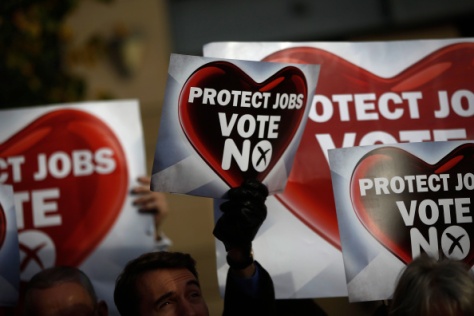
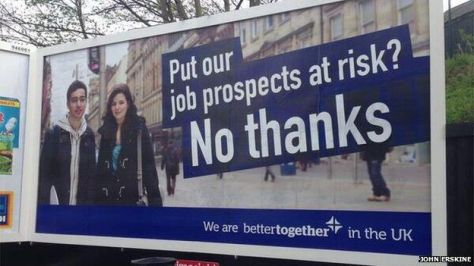
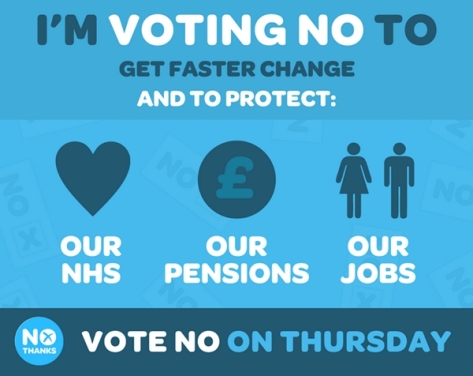
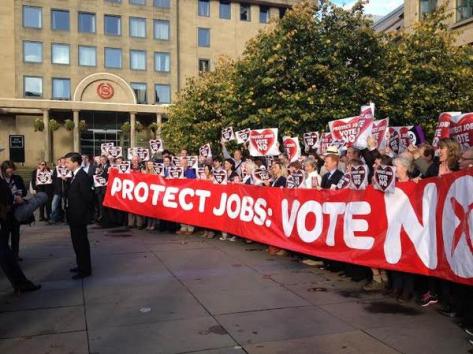
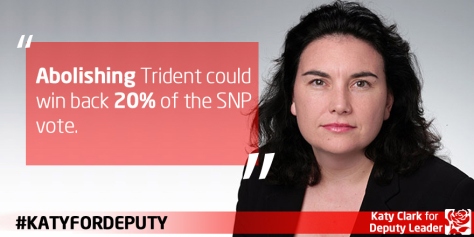


Reblogged this on pictishbeastie.
[…] Source: All The Things They Said […]
This would be the party who managed in a few short years what it took the Tories a generation to do, become irrelevant.
On the day of the referendum, I work as one of the WOS election agents. As we didn’t have many agents to cover our area, I visited a lot of Polling Stations and spoke to a lot of the staff. Yhere were more than a few stories of people breaking down in tears when they were voting and having to be comforted by relatives, One woman was apparently carried out she was so upset casting her vote, These people weren’t voting No because it was the best option, they were voting No because they had been scared witless. For that reason the party who won’t be named will be never be forgiven by me.
We had stories like that too. I encountered a few like that out canvassing: voting No because they had genuine fear for their lives and livelihoods. It can be tough.
Came late to this Al and you have, again, managed to lay bare the bizarre hypocrisy of the other party in a well constructed piece.
What concerns me is the last anecdote where you identify the ability of that party to continue influencing through (probably) some form of propaganda. How are they doing it? Are they leafleting or have they got column inches in local papers? How can sentient beings STILL be duped by these charlatans?
How do we overcome that influence? I have no answer.
[…] November: All The Things They Said – The Other Party made such a big noise about losing jobs at Faslane during the referendum, […]